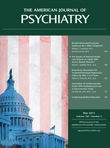T
o the E
ditor: Research on obsessive-compulsive neurobiology has focused on the orbitofrontal cortex and the basal ganglia, and less attention has been given to the functioning of the pineal body. A recent article by Vijay A. Mittal, Ph.D., and colleagues in the September 2010 issue of the
Journal described a pediatric case in which a pineal region tumor was associated with simultaneous onset of obsessive-compulsive and psychotic symptoms (
1). We report on the case of an adolescent with obsessive-compulsive and anxiety symptoms that emerged immediately subsequent to oncological treatment for a pineal germinoma.
“Jonathan” is a 16-year-old young man who presented with severe obsessive-compulsive symptoms, including contamination fears, cleaning rituals, scrupulosity, and checking compulsions, as well as significant generalized anxiety and depressive symptoms. Approximately 3.5 years before presenting to our clinic, Jonathan was diagnosed with a pineal germinoma. Before this diagnosis, he reported no obsessive-compulsive or anxiety symptoms of note and no relevant developmental issues. Jonathan completed radiation therapy and chemotherapy per protocol ACNS0232. Treatment of the germinoma was successful; a multiplanar multisequential brain MRI with and without contrast 2 years after treatment showed a stable postoperative appearance without evidence of tumor recurrence, and no other substantial changes in brain structure were observed. Immediately after completing the germinoma treatment protocol, Jonathan exhibited a dramatic onset of obsessive-compulsive symptoms in the absence of any immune triggers. At the time he presented to our clinic, he was taking fluoxetine (40 mg/day), duloxetine (90 mg/day), and risperidone (1 mg/day), which were collectively associated with partial response.
The timing of symptom onset suggests a possible association of obsessive-compulsive symptoms with pineal body functioning and its associated neurotransmitter, melatonin. In their case report, Mittal et al. (
1) considered the obsessive-compulsive symptoms that developed after a pineal tumor to be possibly related to a basal ganglia stroke that occurred concurrently with the tumor. That did not occur in our case. While pineal functioning has received relatively little attention in obsessive-compulsive disorder (OCD), several lines of converging evidence may suggest relevance. First, case reports have focused on pineal lesion effects in anorexia nervosa (
2), which has high comorbidity and some etiological concordance with OCD. Second, melatonin may alter serotonin metabolism (
3), and melatonin disturbance has been reported in OCD (
4). This case contributes to a small but growing evidence base for pineal gland functioning in the pathogenesis of OCD and related disorders and indicates future work to assess the relationship between melatonin and other biological mediators in OCD (e.g., serotonin).

